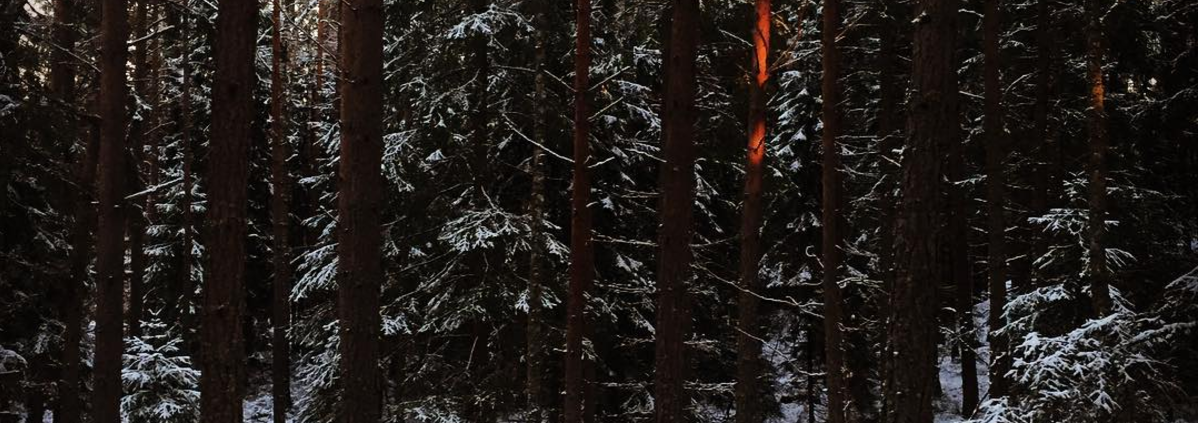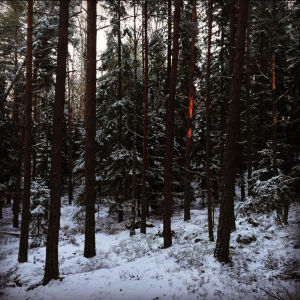The Messenger
Actually, everything was great.
All of his cousins, whom he held very dear but rarely saw, were there, as well as his three siblings. In this clamorous room, the presence of three generations of family members had inspired his uncle, aunt and father to give the most eloquent, heartfelt and hilarious speeches, and his sister and two of his cousins had improvised a musical performance. The treats of the smörgåsbord were delicious — especially the smoked salmon and the wild boar ham.
But now he felt stuffed and sleepy and the heat from the fireplace and the noise from the conversation made him lightheaded. Too many people talking, too many things going on. When he glanced at the big panorama window and saw the frozen lake and the fir trees heavy with snow he felt like being alone for a while, stepping into the silence of the forest and breathing the cold air.
So he just slipped away from the table as quietly he could and walked downstairs.
In the kitchen, he was surprised to see his grandmother. She was sitting at the table, doing a crossword.
“Here’s one for you, my blue-eyed boy!” she said without looking at him. “‘Where the hammer struck 732’, eight letters, ‘R’ and ‘S’ at the end.”
”Poitiers!” he said. “The battle of Poitiers in 732. The Hammer is Charles Martel, the ruler of the Franks.”
“Excellent, you are always so dependable when it comes to the nitty gritty of history.”
She met his eyes and smiled.
”Lovely but noisy — that’s our family,” she said. ”You and me are alike — we need to be alone for a minute to clear our heads from all the chattering and mingling. Are you going out?”.
”Yes, I thought I’d follow the path to Sjölund’s house for a couple of hundred meters and just say hello to the trees,” he said.
”Very well, then I have a suggestion for you. Why don’t you climb the Korpberget Hill and go down the slope to the south? There’s a chance that there is someone down at the little marsh in the creek who has a message for you. And when you come back, I will feed you tea and oranges that come all the way from China.”
He had always loved these little challenges from his grandmother. Ever since they were children, she had organised little games for him and his cousins — treasure hunts, quizzes, little happenings. But this situation puzzled him; it was simply not possible for her these days to walk through this rough forest terrain in twenty centimetres of snow. But on the other hand, there were plenty of able-bodied cousins who could have helped her.
He nodded at her in silence, went out into the hall and got dressed. Outside the house, he avoided the path and went straight out into the snow in the direction of the highest point of Korpberget Hill (“Raven Hill’). The sun was slowly setting, but he didn’t let it bother him while he made a track in the glittering snow with his boots. He felt embraced by the freedom and friendliness of it all: the open, spacious forest hall of pine trunks around him, the unbroken silence, the golden evening light being splashed over the snow and and the stingingly cold, dry air.
At the top of Korpberget he spotted two ravens and heard their lonesome cawing. Odin’s birds, perpetually studying the joy and misery, triumphs and misfortunes of the human race.
He took the slope to the south in long strides — stumbling, sliding and feeling exhilarated by the sharp cold of the snow that hit his face and his neck. After a final somersault at the bottom of the slope he sat for a while and took in his surroundings. The vegetation was thicker here with grave, dark spruce trees dragging their lower branches on the ground. The snow on the ground was punctured everywhere by scrawny bilberry sprigs which held a defiant promise of a distant spring. Still he couldn’t see any signs in the snow of human activity, only the criss-crossing tracks from hares and roe deers.
He got to his feet, brushed the snow off his clothes, took a few steps on the soft, boggy ground; he was apparently at the edge of the little marsh his grandmother had described. And then he stopped in his tracks and stood frozen.
Not more than twenty steps from him was a moose, apparently a bull — tall, slender, formidable.
The creature held still, the man held still and the notion of time seemed to evaporate in the hastily darkening sky and seep down into the half-frozen marsh. A minute passed, two minutes, an hour — a thousand years …
He felt no threat or hostility from the large beast, just some slightly distracted curiosity. The situation was oddly familiar — like the two of them had had similar encounters again and again since … a very long time ago.
One Swedish word crossed his mind and it felt oddly right to put an end to this moment by uttering it. “Hedenhös!” he said. “Time immemorial!”
The moose gave him a final glance and turned around. It took a few slow steps and then fell into an unhurried trot between the spruce trees — light and agile as a ballet dancer with the snow splashing from its legs.
Later, when he had taken off his outdoor clothes and entered the kitchen he felt his cheeks glowing in the damp, warm kitchen air. His grandmother greeted him with a telling smile as he sat down at the table.
“So who did you meet, my blue-eyed son?” she said.
“Someone who brought me a message,” he said. “To help me answer questions like ‘What should I do?’, ‘What is expected of me?’, ‘Where are we now?’”
She nodded: “The moment you know, you know you know. He has always been there, since I was a little girl, bringing me those messages. And he will be there when I’m gone — it’s a very reassuring thought.”
They sat in silence. The room had become dark. On the floor above, the noise went on. Finally, he rose to go upstairs again.
“The Messenger knows,” he said.
”The Messenger knows, my blue-eyed son,” his grandmother said.


